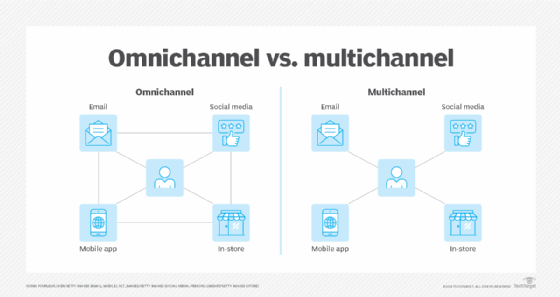
Getty Images/iStockphoto
6 benefits of omnichannel marketing
Omnichannel marketing shares data between interaction channels, like email and live chat, to improve CX. Key benefits include enhanced personalization and customer loyalty.
Consumers use a plethora of digital channels to interact with brands, so marketers must coordinate these touchpoints to work together.
People increasingly expect brands to offer omnichannel experiences, which should provide seamless CX across various touchpoints, like email, web, mobile and in-store. Omnichannel marketing uses software to share and unify data between channels, which can help organizations improve personalization, increase convenience for customers and build customer loyalty.
Explore the benefits of omnichannel marketing to decide if it can help them meet their goals.
What is omnichannel marketing?
Omnichannel marketing integrates marketing channels, like email, in-store and social media, to create a unified CX across all touchpoints. This strategy lets customers move seamlessly between channels and helps marketers personalize messages throughout the customer journey.
The omnichannel approach evolved from multichannel marketing, which is the use of multiple, siloed channels to engage customers and sell products. Multichannel marketing lets customers choose to interact with the business on their preferred channels, but the experience often differs between each one, leading to confusion. Omnichannel marketing addresses that problem, as it uses technology to share data and create consistency between channels so they can work together as a coordinated unit.
6 omnichannel marketing benefits
Omnichannel marketing enhances personalization and is more convenient for customers, which, in turn, can boost customer satisfaction.
1. Improves personalization
Omnichannel marketers use a combination of software, like customer data platforms, content management systems and CRM systems, to collect customer data across channels and aggregate it into a central repository. Marketers can then integrate that data with marketing automation tools to send personalized messages at scale, based on customers' past interactions.
For example, a customer could use a retailer's mobile app to scan and check an item's price in-store but might not purchase it. An omnichannel strategy could track that interaction and automatically send the customer an email alert when the item goes on sale. This personalization offers customers highly relevant advertisements, which can boost sales.
2. Offers convenience
Omnichannel marketing lets them shop and engage with brands on their preferred channels. It also lets customers easily move between channels throughout their journey with the brand. For instance, customers in large home improvement stores often struggle to find items, so the store could offer information on its website about where to find each item. This strategy lets customers use online channels to enhance their brick-and-mortar shopping experience.
Organizations that use omnichannel strategies in this way can reduce the effort it takes for customers to research products and make purchases, which can increase sales and revenue.

3. Builds customer loyalty
In a world where consumers expect exceptional CX, omnichannel marketing can help organizations boost customer loyalty and retention. Omnichannel marketing's high-level personalization can help organizations create a positive CX and, in turn, retain customers.
This increased customer retention can help organizations boost profits because it generally costs less to retain existing customers than to acquire new ones.
4. Enables brand recognition
An omnichannel marketing approach applies the same branding elements -- such as logos, colors and voice -- across touchpoints to create a consistent brand experience, so customers can remember a brand.
Additionally, a consistent brand experience can make customers feel comfortable as they engage on new digital channels. Organizations that don't offer a familiar and recognizable experience across channels might have customers shy away from them.
5. Enhances customer service
An omnichannel marketing strategy can enhance customer service scores because it lets support agents view all customer interactions from a centralized repository, such as a CRM system or customer service platform, regardless of which channels the customer used. This means customers don't have to repeat themselves to support agents, which reduces problem resolution times and improves CX.
Organizations with effective customer service teams can boost customer satisfaction, sales, brand reputation and ultimately, profits.
6. Improves inventory management
Omnichannel marketing lets organizations collect behavioral data from various channels, like social media and e-commerce sites, and use it to improve their inventory management strategies. For example, a retailer might see increased social media engagement around a particular beach umbrella and subsequently increase inventory for that item in coastal store locations. This insight helps organizations purchase the right number of products to meet customer demand.
Omnichannel marketers also use advanced inventory management systems to assign inventory sources, like stores and warehouses, to specific digital channels. This helps organizations tailor their inventory levels to the demands of each channel and automatically route online orders to a source closest to the customer's address to reduce shipping time and costs.
Key takeaways
As digital channels continue to evolve, marketers must stay on top of the latest trends to quickly integrate new channels into their omnichannel strategies. Overall, it helps organizations send offers and sell products on customers' preferred channels, which can boost customer retention and let customers move seamlessly between channels.
Tim Murphy is associate site editor for TechTarget's Customer Experience and Content Management sites.







